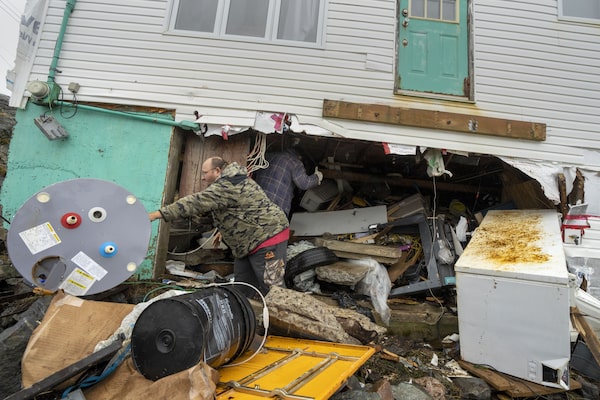
Jamie King clears out the rubble and belongings from the washed out foundation and basement of his house in Burnt Island, Newfoundland and Labrador on Sept. 27.Frank Gunn/The Canadian Press
Jamie King says it’s difficult to talk about what he’s going through, a month after post-tropical storm Fiona tore the back off his home in the southwestern Newfoundland town of Burnt Islands.
His house is destroyed and there’s no hope of fixing it, King said Monday. He and his family are staying with his sister and her family, packed into her two-bedroom house.
It’s not clear when they might be able to rebuild, or where – though he said it won’t be near the ocean in what’s now known as the “danger zone.”
As Fiona drove ferocious swells high onto land on the morning of Sept. 24, King’s shed was swept away completely, along with “thousands and thousands” of dollars’ worth of tools inside it, he added.
Hurricane Fiona the most costly extreme weather event recorded in Atlantic Canada, insurers say
“That was my go-to thing. My safe space, I called it,” he said, adding: “My life as I knew it is gone, ruined.”
The historic storm wrought devastation across Eastern Canada that morning. Some houses – and one person – were swept into the ocean, while other buildings, like King’s, were left destroyed and uninhabitable. On Prince Edward Island, where trees and power lines lay splayed in the streets, some people were without power for three weeks.
On Newfoundland’s southwestern tip, where Burnt Islands sits 30 kilometres east of Port aux Basques, waves as high as 12 metres slammed into the shore, ripping away trees and setting cars adrift. After two days of surveying damage, officials estimated nearly 100 homes in the area were destroyed.
“Obviously there’s still so many people out of their homes and some uncertainty,” Paul Strickland, Burnt Islands’ deputy mayor, said in a recent interview.
The town is doing its best to work with the provincial government to find new spots for people like King to rebuild, he said. Still, Strickland said he’s expecting some to leave the community altogether.
Fiona, he added, has likely changed Burnt Islands forever.
“The landscape alone already has a different look,” he said. “But the nature of the town might be a bit different after this.”